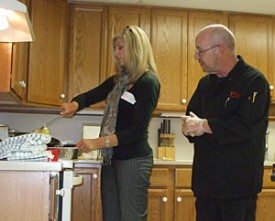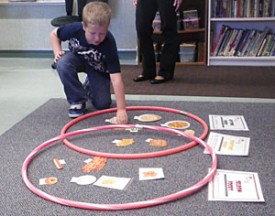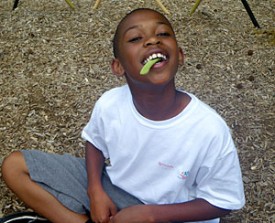New Jersey Students Learn How to “Grow Healthy”

Gloucester County students taste locally grown lettuce, cucumbers and tomatoes as part of their Grow Healthy classroom experience.
For every parent who has lamented the blue slushies served in the lunchroom or watched in horror as Chef Jamie Oliver revealed the synthetic ingredients of school lunches in his Food Revolution TV series, take heart. Something fresh, local, and healthy is coming to New Jersey schools.
Grow Healthy, a new program that combines gardening with nutrition, physical activity, agriculture, and locally grown food projects, has been implemented by the Department of Family and Community Health Sciences (FCHS) of Rutgers Cooperative Extension this school year. Thanks to a U.S. Department of Agriculture Team Nutrition grant awarded to the New Jersey Department of Agriculture, FCHS has introduced this program in nine New Jersey counties: Warren, Union, Hunterdon, Somerset, Mercer, Burlington, Atlantic, Gloucester, and Cape May.
Designed as a fun, hands-on initiative that supports New Jersey Core Curriculum Content Standards, Grow Healthy is a wellness program that involves school teachers, staff and administration, children, families, and volunteers who all work together to make school a healthier place. There are nutrition lessons in the classroom, school and family fitness events, foodservice trainings, wellness council support, and school gardens— all of which build healthier kids and families.
According to FCHS educators, what sets this program apart from other school health initiatives is its comprehensive approach, integrating the various components that inform kids’ food choices. Where other initiatives may fall short, this one goes the extra mile. For example, schools developing wellness policies may find that implementation falls flat when kids are inundated with sugary treats from uninformed teachers, when they are faced with unhealthy choices from limited school food selections, or when meeting resistance from reluctant parents who feel imposed upon by “the cupcake police.”
Grow Healthy’s strategy involves three components: educating food service staff, in-class initiatives, and developing school wellness councils.

In the Spring 2011 training for school foodservice directors/managers statewide, Chef Tom DiPasquale, Chef/Manager Bedminster Schools, with the help of audience participants, demonstrates the making of low fat, whole grain peach crepes.
The first component–food service staff training– began in Spring 2011 and are open to food service staff across New Jersey, in addition to the Grow Healthy pilot schools in the nine counties. Based on results from a Farm to School survey conducted by FCHS in Winter 2011, educators were able to determine the ability of school food service personnel to serve fresh, local produce. They assessed whether schools were able to obtain fresh produce from New Jersey farmers, how they were managing it, and what barriers they encountered. The standards for safe handling of fresh fruits and vegetables are very different from those that pertain to serving processed foods.
The second component–in-class initiatives–employs another three distinct focus areas for lessons: The first—The Food System—addresses where food comes from, what foods grow in New Jersey, and where to access out-of-season produce in New Jersey. The second component—Nutrition and Health—investigates healthy foods choices where kids can learn about and taste different foods, as well as distinguish between everyday vs. sometimes vs. rarely-to-be eaten foods. The third component—Let’s Grow our Own— gives kids hands-on gardening experience and takes them through the food growing cycle from soil preparation to harvest, and in some cases, composting the leftovers.

Interactive classroom lessons make Grow Healthy lessons interactive, fun, and educational.
The third component–school wellness councils–bolsters the ability of schools to implement their wellness policies. This involves school and community partners, including parents, working together on concerns about nutrition, physical activity, and overall school wellness.
Working to implement the Grow Healthy program is a network of people from the nine participating counties that are divided into northern, central, and southern New Jersey regions. The principal investigators of the program are FCHS educators Sherri Cirignano of Warren County, Sandra Grenci of Hunterdon County, Luanne Hughes of Gloucester County, and FCHS Department Chair Kathleen Morgan. Regional coordinators are geared to work with the participating county schools in their respective regions. A number of community volunteers will be trained to provide some lessons alongside teachers and FCHS educators.
What will be the measurements of success for this ambitious program? The Grow Healthy team is no stranger to successful implementation of large scale programs. For the past four years, the FCHS award-winning Get Moving—Get Healthy New Jersey program has succeeded in helping families across the state to choose healthier eating habits and increase their physical activity. Pre- and post-program surveys of students, food service staff, and teachers will measure the increase in knowledge of the various aspects of healthy and locally sourced foods.

Grow Healthy taste testings give students a chance to try some “veggie” good foods.
Sometimes the success of a program is measured in actual changes in behavior. FCHS educator Sandra Grenci relates an instance of triumph when meeting with their participating school wellness advocate, the school nurse from the Frances A. Desmares Elementary School in Flemington, NJ. While tending to a hungry student who was sent to her office, the nurse asked the child what kind of snack she wanted. “Can I have a cup of those little tomatoes?” the child replied, referring to the cherry tomatoes they had tasted from their school garden. Sweet success!
Learn more about the Grow Healthy program.

